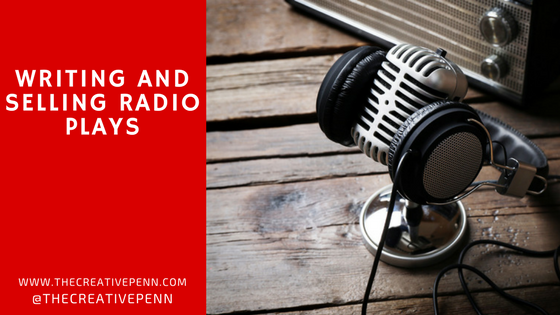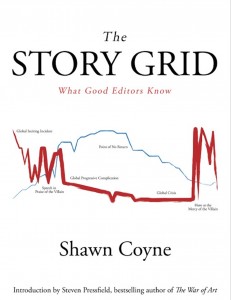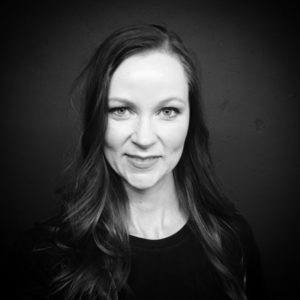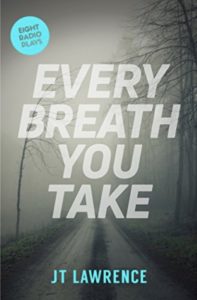The rise and rise of audio means there are more opportunities for authors to write for audio-only productions that go beyond ebook narration.
 I discussed this with A.K.Benedict in a recent podcast, and now J.T.Lawrence answers my questions on how she uses radio plays as part of her writing business.
I discussed this with A.K.Benedict in a recent podcast, and now J.T.Lawrence answers my questions on how she uses radio plays as part of her writing business.
(1) What are radio plays and why are they different to other forms of writing?
Radio plays are stories written specifically for audio consumption. They’re often more dramatic than audiobooks because their production includes a host of actors, sound effects, and music.
It’s like watching a stage play but in your head. For this reason, it can be an extremely intimate form of storytelling.
Writing radio drama is different to other forms of writing in a few ways. A typical radio play is 55 minutes long, which is only half of what you’d have for a film screenplay, so you really need to telescope your story.
It’s such a great way to write because it forces you to distill the vital elements of your concept and this drives your plot forward in a way that’s difficult to achieve in a novel.
Unlike a screenplay, however, there is no budget restriction on your work.
If writing high octane science fiction action adventure is your thing, go wild! Your evil scientist’s city-wide explosion is just a sound effect away. Giant RoboPup hologram show? Nuclear ghost town? Bomb-sniffing locusts? No problem! Bring it on.
This is one of the reasons I love adapting my cyberpunk / futuristic thrillers for radio.

Radio drama relies on the character’s interactions for exposition which cuts down on unnecessary info-dumps that would ordinarily slow the action down.
I find that writing radio drama is faster (and more fun) than novel-writing. Novels will always be my first love, but after the intense process of labouring over a 90K-word novel (plus re-writes, editing, reading aloud, etc.), it’s lovely to write some fun, fast stuff in-between.
This isn’t to say you can’t explore your dark side for radio. I find that my more unsettling work is the most well received.
(2) How do radio plays fit into your writing portfolio and add to your revenue as a writer?
Radio drama formed the foundation of my indie author career and it continues to make up a substantial part of my income.
The royalty payment I received for the very first play I sold in 2007 was a pivotal moment for me. I couldn’t believe that someone was willing to pay me for something I had enjoyed writing. The payment amounted to a third of my monthly salary at that time, for a story I knocked out in a few hours.
It changed something inside me, made me believe that my writing was worth something, and it was the first hint of an idea that I could make a living with my writing. To this day I find being paid for my writing extremely validating, which in turn makes me more prolific.

(Bonus: Sometimes the radio station will re-broadcast your play, and you’ll get surprise extra royalties. It’s like finding $100 in your pocket, but way better.)
(3) What are your top tips for writing original material for radio plays?
All the usual storytelling rules apply, with an emphasis on action and character development.
- Because of the intimacy of the medium, character development is key.
- Plot! It’s easy to get lost in the weeds and land up with too many words. A tight outline will keep you in the game.
- Strip out every word that doesn’t propel the story forward.
- Extra points if you make it relevant to the target audience.
- Enjoy it! It’s a challenging, fun way to write.
(4) What are your tips for adapting existing work for radio plays?
Writing an adaption may seem intimidating at first, so start with a bird's eye view.
- How long is your novel?
- How many episodes will make up the serial?
For example, an 80K-word novel = 10x 8K episodes of one hour each.
Next, you highlight the key scenes, and make sure that each episode has:
- A) something exciting and important happening; and,
- B) a hook at the end.

Then I use the grid as part of my pitch to the radio station, so they can see the outline at a glance, plus where the crucial plot points and hooks are.
The added benefit of adapting a novel as a radio serial is that it forces you to take out any unnecessary words and scenes, and you can then go back and hone your novel further. I find that it’s a great editing tool.
(5) How can writers find appropriate markets for radio plays in their country?
I’d start with your national broadcaster. Many countries have a mandate to produce a certain amount of local content. I’m very lucky that this is the case in South Africa.
 (6) Where can people find you and your books online?
(6) Where can people find you and your books online?
All of my books are available on Amazon. I’d be more than happy to share one of my radio play scripts as a template to work from, and to answer any questions your readers may have on Twitter or my Facebook page.
I also have a collection of radio plays published on Amazon as an ebook for any writers who are interested in reading more in the medium.
I wish anyone who is keen to try playwrighting the best of luck!
Have you considered adding radio plays to your writing repertoire? Please leave your thoughts below and join the conversation.

Connect with her on Twitter @pulpbooks.



I enjoy writing short stories, and I find myself penning most of mine after I have completed the first draft of a novel.
It’s always good to put an unfinished manuscript aside for a few weeks before starting on the long, and sometimes daunting editing process. Thus, it’s the perfect time for other projects, like writing short stories.
I write a lot of dialogue in my novels. I would love to give this a try. But I have not run in to radio drama. Everything is news or music. Well, there is a little drama for children and teens.
I have just begun to write audio plays and hope to continue and find an outlet. I understand the BBC do not want scripts until September so will have to try locally. I am slightly concerned about the publishing side. Do I need an ISBN? Should I self publish on KP or is the fact that it exists enough for me to offer it to be performed?
Once a script of mine has been produced as an audio play what happens next?
Should I write a number of plays and then put them into book form?
Is there any outlet for a 15minute play that is not part of a longer series?
I tried writing a play based on one of my novels and put it in for a competition but it wasn’t used.
So far only amateurs have used my material.
Still hoping! J.
Thanks for this helpful information, Joanna. So we now have a return to the theatre of the mind. 🙂 — Suzanne
The sonic society have a ton of radio drama you can listen to. Great stuff! http://sonicsociety.org/
I don’t think my mainstream national radio station would accept dark material (such as sexual violence and gore/horror) – I was thinking maybe podcasts? but I don’t really know where to start in trying to pitch/sell my radio play (which isn’t finished yet – I have the treatment 60pgs without an ending. I’m thinking of making it a serial)
Two questions …
1: Are agents a requirement for getting a radio drama placed? Or is it better – in this case – without them?
2: Does a writer have to be resident to the country of the radio station he intends to submit to?
Hi
Can u please tell me how much money I should expect from a radio drama of my father. He is no more n I have the royalty of his writings
Sorry, you need to pitch to companies that produce radio dramas and they will be able to tell you rates.